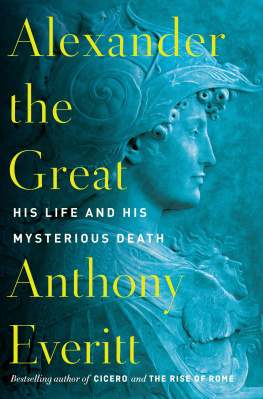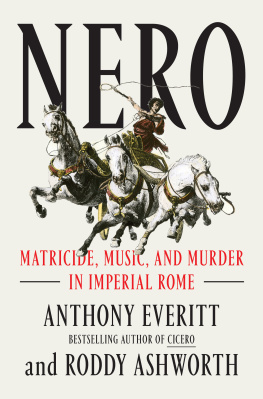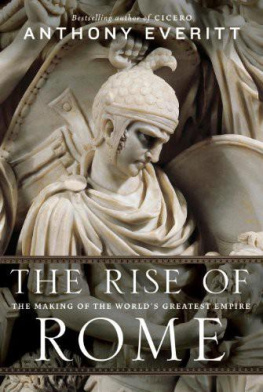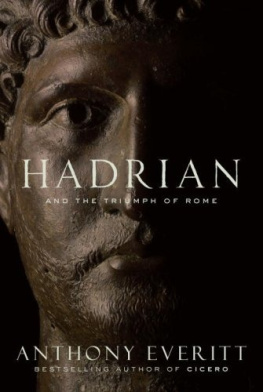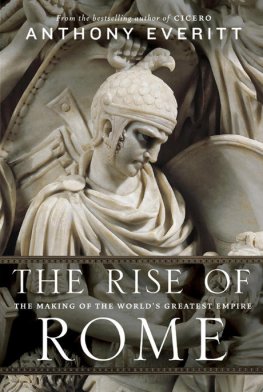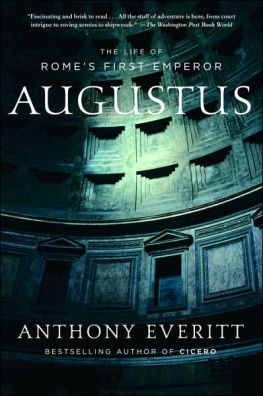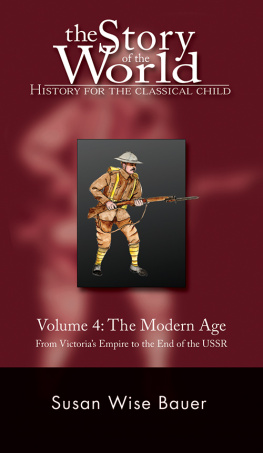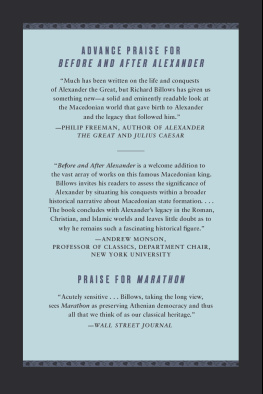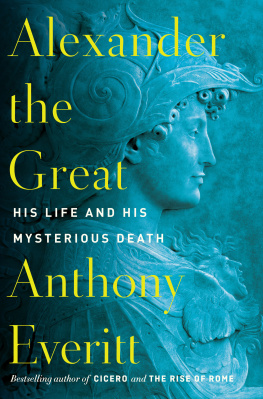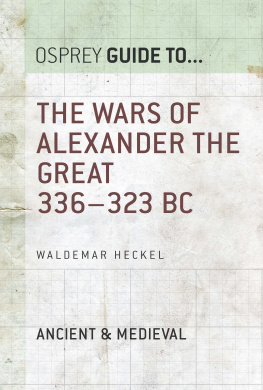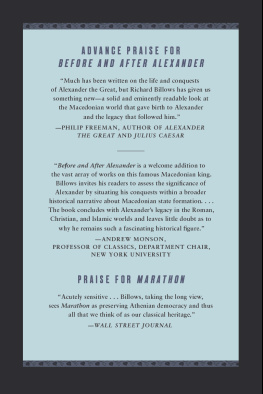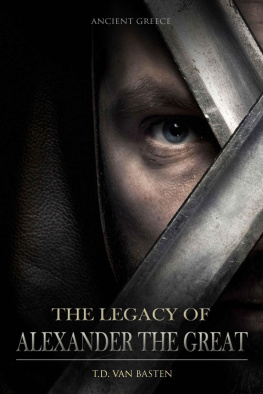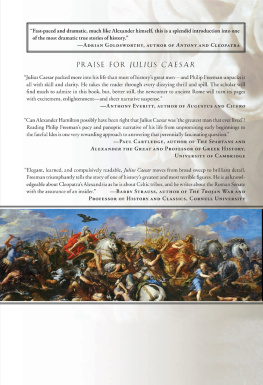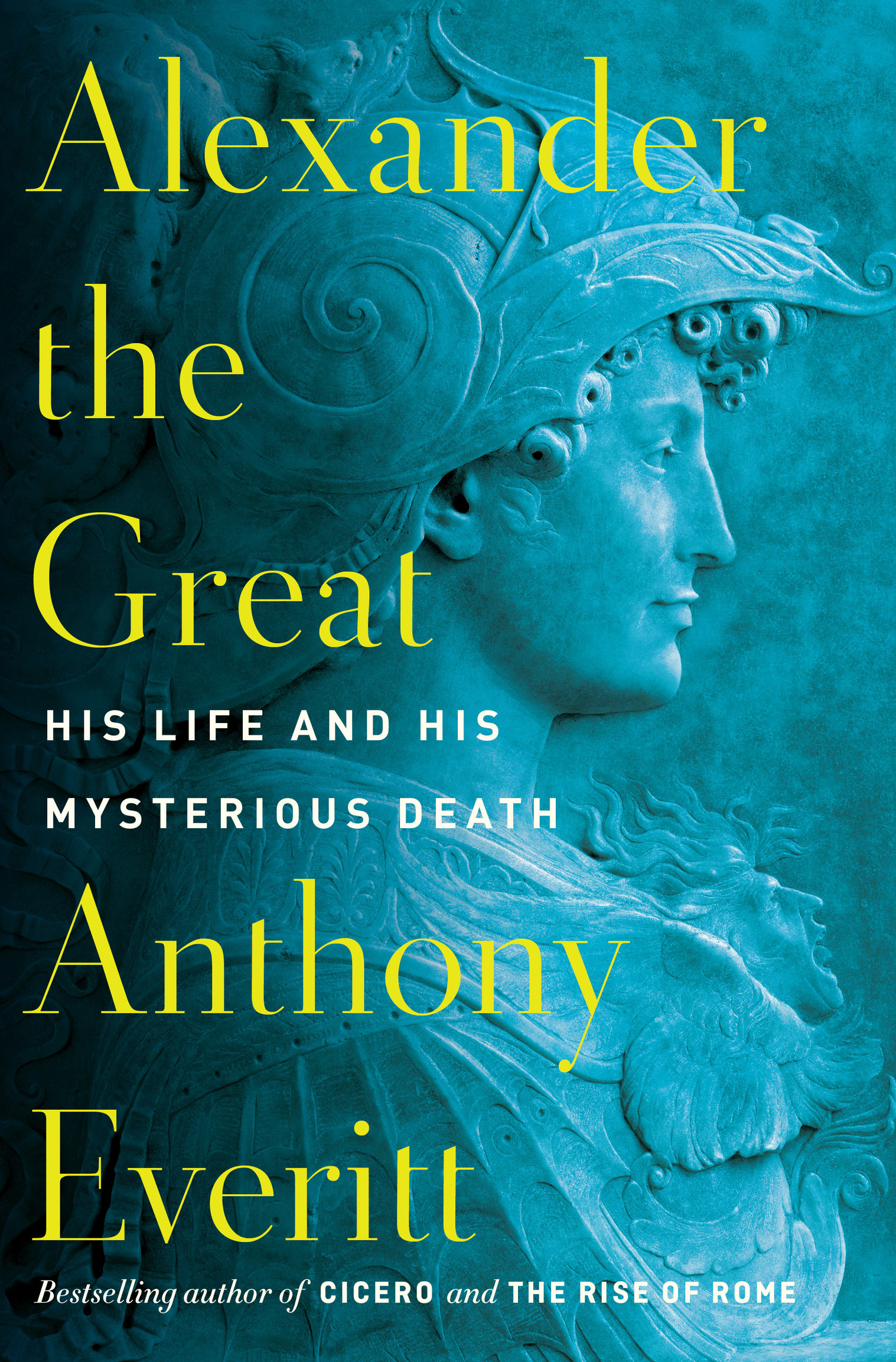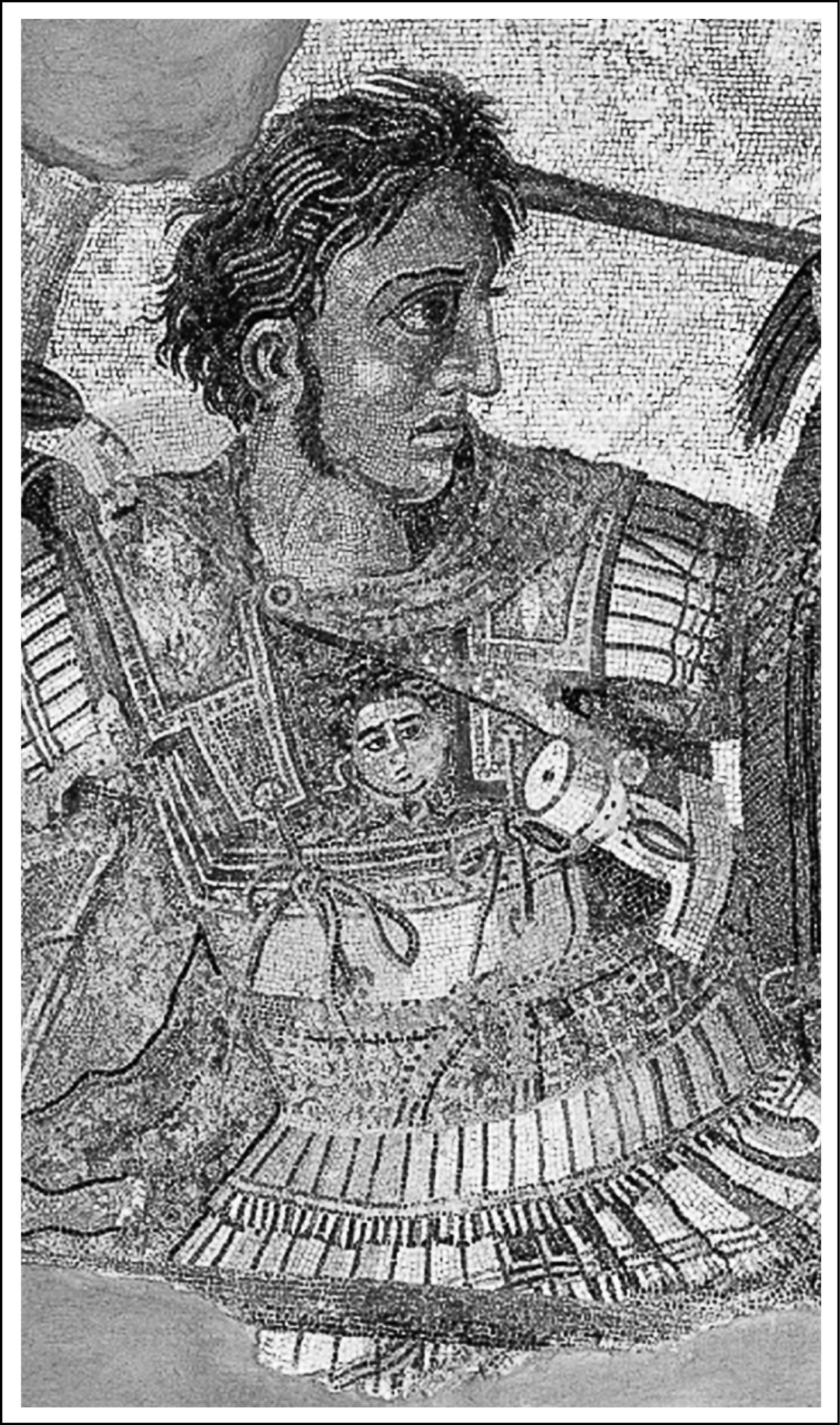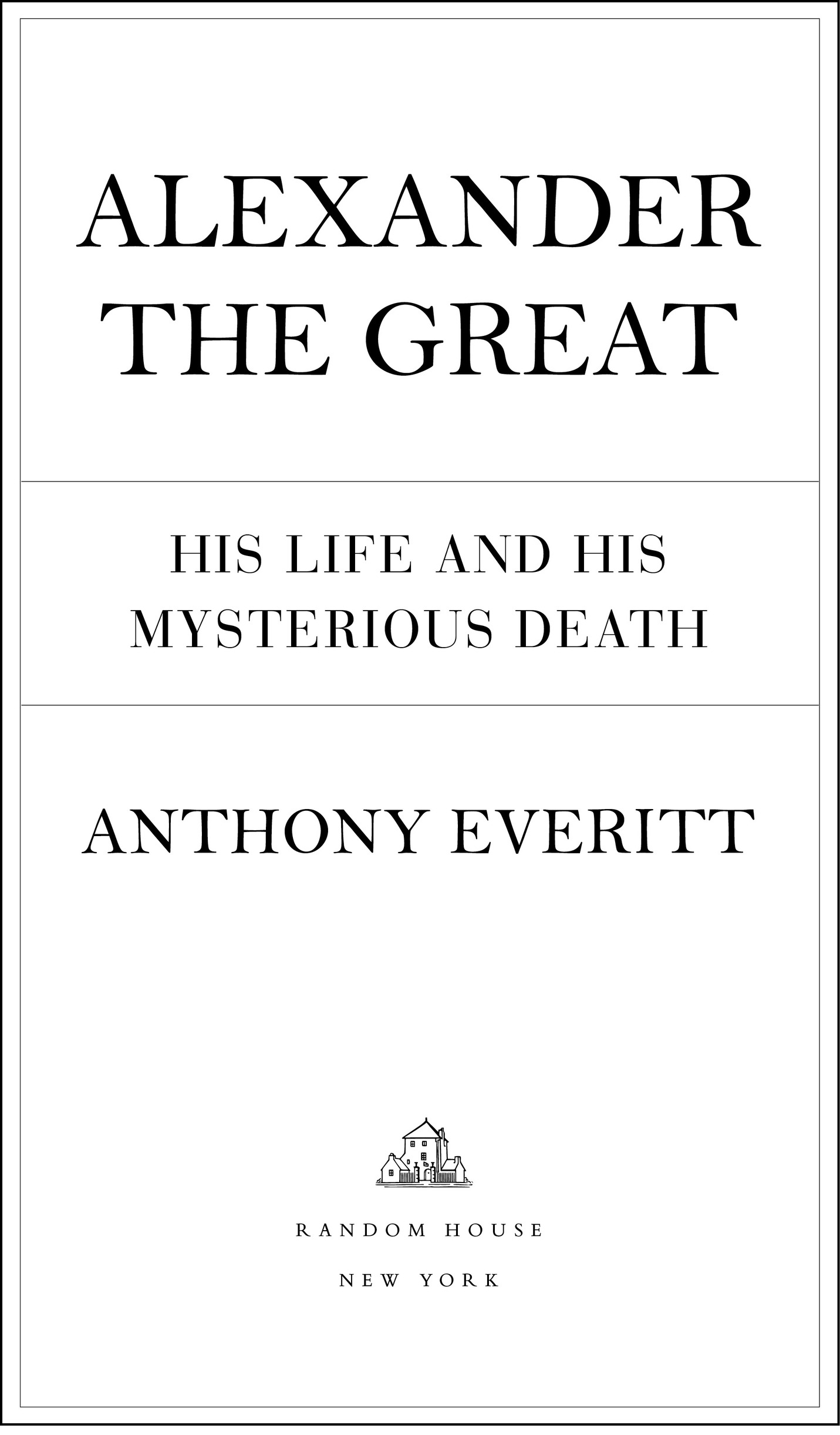Contents
Landmarks
Print Page List
Copyright 2019 by Anthony Everitt
Maps copyright 2019 by David Lindroth, Inc.
All rights reserved.
Published in the United States by Random House, an imprint and division of Penguin Random House LLC, New York.
R ANDOM H OUSE and the H OUSE colophon are registered trademarks of Penguin Random House LLC.
Illustration Credits: Alexander, Carole Raddato/Wikimedia Commons; shrine of the nymphs, Mieza, Jean Housen; Hephaestion, unknown; lion of Chaeronea, Odysses; theater at Aegae, CJD (Jim) Roberts; royal crown and larnax, Sarah Murray/Wikimedia Commons; Philip II, Manolis Andronikos; Artaxerxes III, Bruce Allardice/Wikimedia Commons; bringers of tribute, A. Davey; Cyruss tomb, Soheil Callage; Issus, https://upload.wikimedia.org/wikipedia/commons/a/ae/Battle_of_Issus.jpg; Alexander sarcophagus, CC-BY-SA-2.5; hunting scene, Carole Raddato/Wikimedia Commons; Tachar palace, Persepolis, Darafsh Kaviyani; marriage of Alexander and Rhoxane, Web Gallery of Art; tetradrachm, ancientcoincollector; Gedrosian desert, Marsyas.
LIBRARY OF CONGRESS CATALOGING-IN-PUBLICATION DATA
N AMES: Everitt, Anthony, author.
T ITLE: Alexander the Great: His Life and His Mysterious Death / Anthony Everitt.
D ESCRIPTION: New York: Random House, 2019. | Includes bibliographical references and index.
I DENTIFIERS: LCCN 2018059885| ISBN 9780425286524 (hardback) | ISBN 9780425286548 (ebook)
S UBJECTS: LCSH: Alexander, the Great, 356 B.C. 323 B.C. | GreeceHistoryMacedonian Expansion, 359323 B.C. | GeneralsGreeceBiography. | GreeceKings and rulersBiography. | BISAC: HISTORY / Ancient / General. | BIOGRAPHY & AUTOBIOGRAPHY / Historical. | HISTORY / Military / General.
C LASSIFICATION: LCC DF234.E84 2019 | DDC 938/.07092 [B]dc23 LC record available at https://lccn.loc.gov/2018059885
Ebook ISBN9780425286548
randomhousebooks.com
Book design by Barbara M. Bachman, adapted for ebook
Cover design: Anna Bauer Carr
Cover art: RMN-Grand Palais/Art Resource, N.Y.
v5.4
ep
Contents
PREFACE : THE KING TAKES A HOLIDAY
More than two millennia have elapsed, but Alexander the Great is still a household name. His life was an adventure story and took him to every corner of the known world. Good looks burnished his image. His memory and his glamour persist.
MODERN SCHOLARS HAVE TRIED their best to tell the truth about the young Macedonian, but their accounts reflect the concerns of their own age as much as they do of his. In the first half of the twentieth century, he was the model of an English gentleman and an idealistic believer in the unity of mankind. After the Second World War, he became for many a prototype of the totalitarian dictator, a classical Hitler or Stalin.
It is time for a new look. Naturally this biography reflects our own twenty-first-century hopes and fears, most particularly about the nature of power and the fascinationand impermanenceof military success. It could hardly do otherwise. But I aim to evoke the realities of life in the ancient world, the beliefs Alexander might have held. In many ways, he was a typical Macedonian king and was nothing like a modern statesman. He deserves to be measured against the values of his own time and not of ours.
My intention is to understand rather than to praise or to condemn.
AN UNTRIED KING OF Macedonia hardly out of his teens at the outset of his campaigns, Alexander conquered the vast Persian empire and never lost a battle. He was one of the worlds great commanders.
His somewhat ambiguous private life has attracted more than its fair share of attention and he has become a gay icon (although he was not much interested in sex with any gender).
Alexander was naturally inquisitive and was intrigued by science and exploration. He enjoyed athletics and the arts, and used the poet Homers great epic about the Trojan War, the Iliad, as a bible.
His life ended when he was only thirty-three, but, paradoxically, this has kept him evergreen in our imaginations. However, his personality had a dark side. He glorified war and the fame it conferred on the valiant, as did many of his contemporaries. He enjoyed violence and was suicidally brave, appearing to see fighting in battle as a form of healthy physical exercise.
From time to time he committed acts of great cruelty, but he was also chivalrous, kind, and loyal.
ALEXANDERS DEATH IS AN unsolved mystery. Was he a victim of natural causes, felled by some kind of fever, or did his marshals assassinate him, angered by his tyrannical ways? An autopsy would decide the question, but it is too late for that.
The trail is long cold. All who recalled the terrible fortnight of his dying had their own reputations to protect and they were not under oath when publishing their memoirs. The secret of Alexanders end will not be discovered by poring over disputed narratives, but by assessing his interaction with others. Who were the men and women he knew, and who his friends and enemies? What did they think of him and he of them? Where lay their loyalties, and where the imperatives of self-interest?
This book follows Alexanders spectacular career, and its sudden conclusion, as if it traced the trajectory of an arrow. It will lead us eventually to an unraveling of the riddle.
IN THE YEAR 323 B.C. Alexander enjoyed an overdue vacation in the deluxe metropolis of Babylon in Mesopotamia. This was one of the great cities of the Persian empire and over the centuries had grown accustomed to looking after the needs of invaders. Its Hanging Gardens were one of the Seven Wonders of the ancient world. A few weeks there of uninterrupted leisure and pleasure were just what Alexander and his careworn soldiers needed.The youthful Macedonian monarch had spent a good ten years fighting his way nonstop through the Persian empire to its Indian frontier, deposing the Great King and seizing power himself. After winning victories in the Punjab and along the Indus River, he marched back to civilization through a searing desert, losing thousands of his men for lack of water before reaching the safety and the comforts of Mesopotamia.
Alexander was still a handsome man in his prime whose triumphant past augured a shining future. His next and imminent project was to establish commercially viable townships along the Arabian coast. A port had been specially built near Babylon to house a new fleet. Meanwhile the army prepared to march south by land. Victory was taken for granted, but after that, who knew what?
For now, in late May, as the unrelenting heat of summer approached, he needed a good rest. Babylon had all the necessary facilities. There was water everywhere; the river Euphrates on its way to the Persian Gulf passed through the center of the city and poured into the moats that lay alongside the lofty defensive walls of baked mud brick. And beyond the walls lay swamps and lagoons bursting with wildlife, irrigation channels, and reservoirs.
Two colossal palaces stood in the north of Babylon, with offices and workshops. One of them functioned, at least in part, as among the worlds earliest museums, housing treasured artifacts from earlier times, and was probably where kings and their families lived in grand but private seclusion. The other, which modern archaeologists have named the Southern Palace, was set aside mainly for administration and for ceremonial functions. Offices and workshops surrounded five courtyards, one of which opened onto a vast throne room whose walls were glazed in blue and yellow tiles and decorated with floral reliefs, lions, and fan-shaped designs suggesting the fronds of a palm tree.

